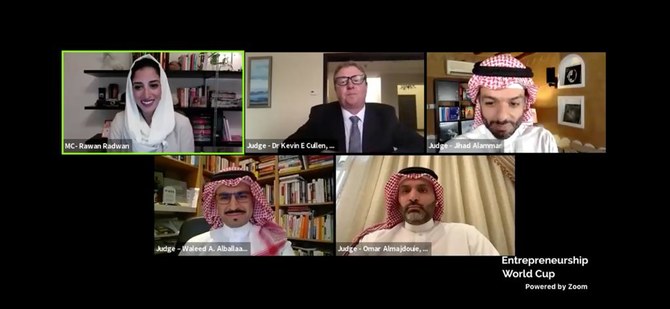RIYADH: Six Saudi startups have qualified for the Entrepreneurship World Cup (EWC) Global Finals to be staged at the Misk Global Forum in October.
The startup Talon Dust Control emerged as the champion of the EWC Saudi National Finals, along with startups Edama Organic Solutions placing second, BrightSign Health Tech third, Upskillable LLC. fourth, Peregrine Genomics fifth and Miqyas sixth.
Talon Dust Control provides soil control and stabilization solutions through a uniquely formulated product range for local conditions.
After the success of the inaugural event held at the Misk Global Forum 2019, the Mohammed bin Salman Foundation (Misk) is geared up for the EWC 2020 taking place between Oct. 18 and 20 following the Saudi National Finals held on Monday.
Due to the coronavirus pandemic, this year’s National Finals were held virtually.
Presented by the Misk Global Forum and hosted by the Global Entrepreneurship Network and the Global Education and Leadership Foundation, 14 Saudi startups competed to be crowned the six best entrepreneurs in the National Finals of the EWC, that celebrate the talent and innovation of a new generation of innovative Saudis.
The major part of the National Finals included Saudi startups and entrepreneurs delivering three-minute pitches, followed by a two-minute question and answer session by judges.
The entrepreneurs were competing for six cash prizes of $50,000 and entry into the Global Finals at Misk.
Three live panel discussions were held, featuring distinguished entrepreneurship experts exploring the theme: “Overcoming Challenges: How new businesses can overcome obstacles to achieve success.”
A further panel included videos and testimonials celebrating the success of Saudi startup finalists in the 2019 EWC titled: “Where are they now?”
The National Finals session was moderated by Rawan Radwan from Arab News, whose organization was the strategic media partner for the event. The session aims to encourage entrepreneurs to launch their ideas and take their companies to global audiences, while also engaging aspiring entrepreneurs to consider new career paths.
Speaking at the opening session, Badr Al-Badr, CEO of the Misk Foundation, said entrepreneurship plays pivotal role in economic diversification and development.
“Earlier, people wanted to be doctors, engineers, lawyers and other traditional professionals, now they aspire to be entrepreneurs,” he said, adding that the government is thankfully encouraging it.
Amal Dokhan, CEO of the Global Entrepreneurship Network, also moderated a panel discussion and spoke on the future of entrepreneurship.
The EWC agenda of “Overcoming Challenges” was elaborated upon in a statement.
“There are little doubts that 2020 is a very special year. In less than six months, COVID-19 has transformed the world as we know it, affecting all eight billion of us. Across the globe, individuals and businesses have had to adapt to a remote, socially distanced reality. Prior to the pandemic, startup founders were already well-aware that resilience is crucial for their professional success. In 2020, resilience is now more important than ever. Coupled with strong adaptive capabilities, it enables existing and prospective entrepreneurs to overcome challenges and accelerate their entrepreneurial journey.”
The event was co-organized by King Abdullah University of Science and Technology (KAUST), Prince Mohammad Bin Salman College of Business and Entrepreneurship and the Global Entrepreneurship Network and strategic media partner, Arab News, while the General Authority for Small and Medium Enterprises and the Ministry of Communications and Information Technology were ecosystem partners for the event.
The EWC is the world’s largest and most diverse pitch competition and support program for entrepreneurs, bringing together startups of all sizes from about 200 countries.
Despite the pandemic, EWC 2020 has attracted over 174,000 applications this year from 200 countries. About $1 million in cash prizes will be up for grabs at the EWC Global Finals in October.
Those taking part can access free training materials from experienced mentors and up to $25,000 worth of perks from dozens of partners, including Zoom, Amazon Web Services and Shopify.
It includes an integrated training and mentoring program to help entrepreneurs hone their skills and increase their chances of success. The participants will work closely with mentors and other specialists, from the idea stage to the growth and structure of businesses.
Participants will have access to a digital library that contains a wide range of expert knowledge and advice to help them succeed, including guides to drawing up business plans and structuring projects, to collecting customer feedback, product development, team building and corporate culture guides.
Last year, there were about 102,000 entries from 187 countries. About 100 participants reached the semi-final and had the chance to present their ideas to thousands of people.
Red Sea Farms, a Saudi startup based at KAUST that specializes in saltwater greenhouse technology, finished third in the inaugural EWC.



































